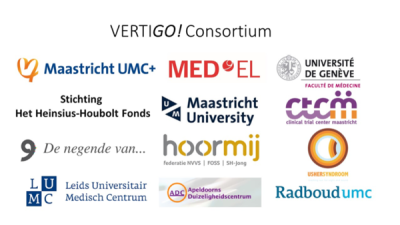VertiGO! - In balance with the artificial balance organ
In the VertiGo! trial, the safety and efficacy of an innovative artificial balance and hearing implant were rigorously assessed in a prolonged stimulation setting. This study aims to bridge the translational gap between controlled research environments and real-world clinical implementation. To this end, the Maastricht-Geneva research team collaborates closely with industrial partner Med-el, along with multiple patient organizations and divers stakeholders, ensuring a seamless integration of cutting-edge technology into a patient-centered application.
The vestibular system plays a fundamental role in postural control, gaze stabilization, and spatial orientation. Vestibular dysfunction significantly impairs these essential functions, leading to a marked decline in quality of life. Despite an estimated 53 to 95 million individuals affected by vestibulopathy in Europe and the United States, a clinically viable treatment to restore vestibular function has remained elusive.
The vestibulo-cochlear implant represents a groundbreaking therapeutic approach for individuals with bilateral vestibular loss. Within the VertiGo! trial, this novel device is systematically evaluated in a prolonged stimulation setting. Over the course of several weeks, a comprehensive array of outcome measures is employed to assess its safety and efficacy.
Between 2021 and 2023, eight participants successfully received a vestibulo-cochlear implant. The vestibular electrodes were meticulously positioned within the semicircular canals using advanced intraoperative imaging techniques. In seven of these individuals, electrical stimulation elicited vestibular reflexive eye movements, with most reporting motion sensations corresponding to the targeted vestibular canals. Notably, acclimatization to the stimulation was rapid and well tolerated, with no reported adverse effects.
Prolonged stimulation weeks have demonstrated that motion-modulated input—rather than constant stimulation—yields superior functional outcomes. All participants maintained stable auditory performance, even when the combined implant was active. These findings establish a solid foundation for a follow-up trial into home-based applications while underscoring the need for individualized optimization of stimulation parameters.


